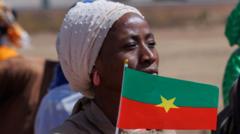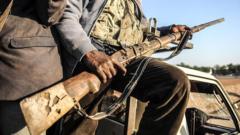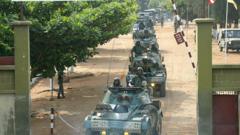Niger's military authorities have imposed a three-month ban on BBC broadcasts, citing the potential spread of fake news as a destabilizing factor amid ongoing jihadist threats.
Niger's Military Suspends BBC Broadcasts Amid Jihadist Coverage Controversy

Niger's Military Suspends BBC Broadcasts Amid Jihadist Coverage Controversy
Niger's military government halts BBC programs for three months, claiming misinformation threatens national stability.
Niger's military government, led by Abdourahamane Tchiani since a coup in July 2023, has announced a suspension of BBC broadcasts for three months, alleging that the network has been disseminating false information that threatens social harmony and undermines the morale of troops combating jihadist forces. The announcement was made by Minister of Communication Raliou Sidi Mohamed, with the suspension taking immediate effect.
The BBC, which broadcasts programs in Hausa and French—languages spoken by roughly 2.4 million people in Niger (17% of the adult population)—will halt its radio broadcasts; however, access to the BBC's website remains open, and the radio can still be tuned in on shortwave frequencies.
The government did not specify the exact broadcasts that led to this action, but it comes in the wake of BBC reports detailing recent violent jihadist attacks in the Tillaberi region. These reports indicated that 91 soldiers and nearly 50 civilians were killed in the assaults, drawing the junta's ire as they called the information "baseless assertions" designed to weaken soldier resilience and incite division.
These attacks, reportedly carried out by militants aligned with the Islamic State group, were widely covered by various sources, including security blogs. They described instances where attackers posing as civilians ambushed soldiers at a local market, leaving them unable to retaliate without risking civilian casualties.
In response to the ban, a BBC representative reaffirmed their commitment to accurate reporting, stating, "We stand by our journalism and we will continue to report on the region without fear or favour." The situation mirrors actions taken against other foreign media outlets, such as France24 and Radio France Internationale (RFI), both also suspended in Niger post-coup, amidst broader regional tensions concerning media coverage of military operations.
Niger's government has even hinted at legal action against RFI, accusing it of inciting genocide, a claim RFI described as "extravagant and defamatory" with no substantiation. As the Sahel region faces an escalating insurgency from various terrorist groups, these foreign media suspensions reflect a growing trend among military dictatorships in West Africa. The challenges posed by jihadist violence continue to persist, raising questions about governmental capabilities and the role of independent media in navigating these conflicts.





















